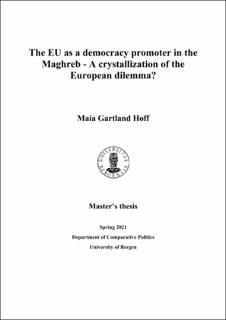The EU as a democracy promoter in the Maghreb - A crystallization of the European dilemma?
Master thesis
Permanent lenke
https://hdl.handle.net/11250/2770625Utgivelsesdato
2021-07-02Metadata
Vis full innførselSamlinger
- Master theses [113]
Sammendrag
In 2021, High Representative of the EU, Josep Borrell, stated that; “25 years after the Barcelona Declaration and 10 years after the Arab Spring, challenges in the Mediterranean – many of which resulting from global trends – remain daunting”. Has the EU failed in its most plausible attempt to create democracy in its neighborhoods? To attempt an answer to this question, this study investigates how the nature of the EU as an actor in world affairs affects its ability to promote democracy in its neighborhoods. Normative Power Europe (NPE) has been one of the most cited theories when explaining the EU’s role in world affairs, and this thesis investigates to what extent NPE can explain the EU’s role as a foreign policy actor in the Maghreb. The thesis applies a comparative historical approach of the (1) Moroccan, (2) Algerian and (3) Tunisian case. The analysis is based on document analysis of primary and secondary sources as well as conducted interviews with local and European functionaries in the region. This thesis concludes that the large gaps in rhetoric and practice reinforce the perceived nature of the EU by not fulfilling its promises in protecting human rights and promoting democracy, hindering its ability to be a normative power. However, the analysis shows that the EU has the possibility to take a sui generis role, because the EU does not have the same colonial baggage as many of its member countries. Nonetheless, for this to function the EU would need to solve problems of coherency and mend the gap between rhetoric and practice. This understanding of the EU as a foreign actor in its neighborhoods can help adapt the policies towards the region in such a way that they can be better implemented.
